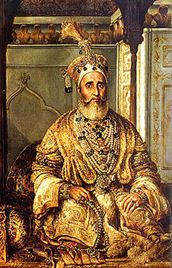
21 September, marks 158 years since the end of the Mughal empire. On 20 September 1857, the British forces consolidated their hold over Delhi. It was game over for the Indians soldiers fighting against them. Many of them fled from the city.
It was then that Mughal emperor Bahadur Shah Zafar too decided to leave the fort for the safety of Humayun’s tomb. He didn’t know at the time, but he would surrender the next day, marking the end of the Mughal empire.
There have been many accounts of the two fateful days, but the most graphic are by Khwaja Hasan Nizami in his book Begumat ke Aansu (Tears of the Begums), which he wrote in the early 1920s based on eyewitness accounts as well as the stories he heard from his mother, whose father, Khwaja Shah Ghulam Hasan, was the Sajjadanasheen (hereditary administrator) of Hazrat Nizamuddin’s dargah at the time.
The beginning of the end
When Bahadur Shah left the Qila e Moalla (the name by which the Red Fort was then known), he went straight to the Dargah of Mehboob e Ilahi Hazrat Nizamuddin Auliya. It is said that the Emperor was in a state of despair and hopelessness.
He was all alone except for the porter carrying his sedan chair and a couple of Khwajasara (court eunuchs or hijras) with him. He had already sent his family ahead to Humayun’s tomb, where he was to join them later.
When Khwaja Shah Ghulam Hasan heard that the Emperor had come to the dargah, he hurried there to find the tired, dusty monarch sitting against the shrine.
Bahadur Shah Zafar addressed the Khwaja and said that he had been reconciled to his fate for a long time. He was a Sufi himself with great faith in mendicants. A famous Sufi mendicant had already told him, even before the ‘rebel’ soldiers had come to the Qila, that the fate of the Mughal Empire was sealed.
Bahadur Shah and his predecessors were paying for the sins of his ancestors. Bahadur Shah said he wanted no more bloodshed and so he had left the Qila, giving the British a free hand once they entered it.
“I have known for some time that I am the last of the glorious Timurid line. Now someone else will be the ruler. Their law will prevail. I don’t have any regrets; after all, we too had usurped the throne from someone else.”
He went on to say that when Amir Timur invaded Constantinople, he had acquired some Holy Relics of Prophet Muhammad from Sultan Yildaram Beyazid. These were hairs from the holy beard and had been in the custody of the Mughal rulers till now, but as “there is no place for me under this sky or on this earth, I am handing it over to you for safe custody.”
Khwaja Shah Ghulam Hasan took them away and locked them in the dargah’s treasury.
After that the Emperor said, “I have not eaten for more than a day (teen waqt). If you have any food in your house please bring it.”
Khwaja Hasan immediately asked the Emperor to accompany him home. But the Emperor refused, saying that he would not put the lives of the sons of his Spiritual Master in jeopardy for the sake of his old worthless self. He had just come to take the blessings of the saint and hand over the relics. He had done both; now he would leave after a bite to eat.
All that was in the house was besan ki roti aur sirke ki chutney (gram chapatti and vinegar relish). After the Emperor had eaten, he made his way to Humayun’s tomb.
What happened there is well-documented.
The end of the end
Much has been said of Major Hudson’s capture of the Badshah and subsequent trial. What many may not know is that General Bakht Khan, the commander of the Indian forces in Delhi, had exhorted the Emperor to come away with them before he left the Qila.
He had said, “Although the British have taken the City, militarily it is not a big blow to the Rebel Army as the whole of Hindustan is up in arms against the British and everyone is looking up to you for guidance.
Travel with me to the mountains from where the fight can be continued in such a way that the British would not be able to break through.”
The Emperor was inspired by the speech and asked Bakht Khan to meet him in Humayun’s tomb the next day; the tomb, at the time, was located on the outskirts of the city.
As soon as Bakht Khan was sent off by Bahadur Shah Zafar, it was all over for him.
Mirza Ilahi Bux and Munshi Rajab Ali, spies for the British, overheard this and carried the news to their masters and promised to persuade Bahadur Shah to stay in Delhi.
Mirza Ilahi Bux was the Emperor’s father-in-law and was furious with him for the preferential treatment given by the Emperor to Zeenat Mahal – the youngest wife – and her son. Ilahi Bux’s grandson and the Emperor’s heir apparent had been poisoned to death a year before, in which Zeenat Mahal was suspected.
The Emperor trusted the two when they implored him to stay in Delhi, despite warnings from his Khwajasaras. While Major Hudson waited at the western gate, these two entered the tomb and convinced the Emperor with their oratory that the best course for him lay in going back to the Qila with Hudson and not with Bakht Khan.
He was arrested and put on trial and later exiled to Rangoon.
The rest of course is history
( published in Catch News http://www.catchnews.com/culture-news/what-bahadur-shah-zafar-did-on-his-last-day-as-mughal-emperor-1442836586.html
The rest, of course, is history.

